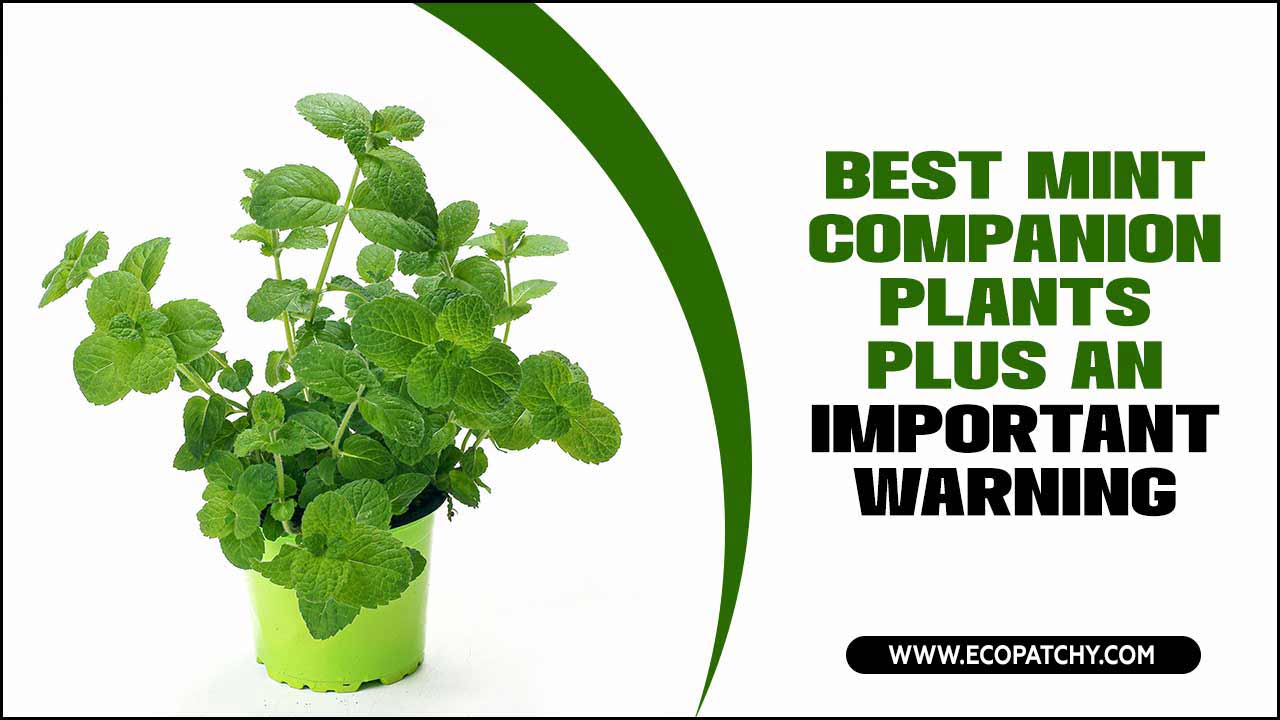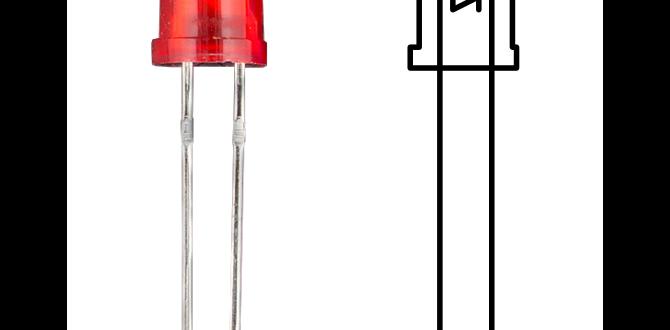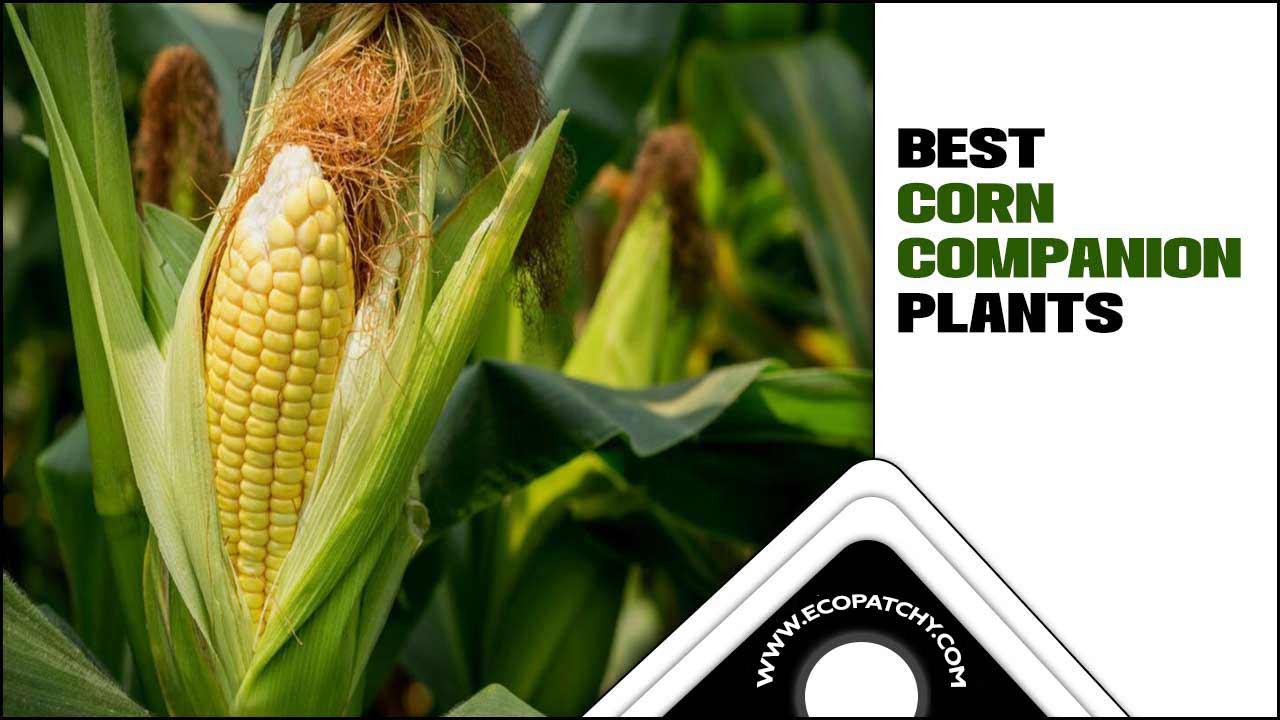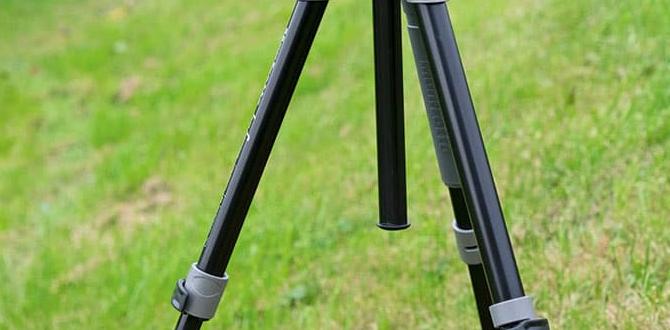Have you ever wondered if using composted manure is safe for your vegetable garden? Many gardeners ask this question. After all, we want our plants to thrive and be healthy.
Composted manure is often used to enrich soil. It can add nutrients to help veggies grow. But can it also bring risks? This is a common concern. Imagine spreading manure in your garden, only to find your veggies taste funny or worse, make you sick. Yikes!
Here’s a fun fact: composted manure, when done right, can be a super food for your plants! However, knowing how to prepare it well is key. Are you ready to dig deeper? Let’s explore if composted manure is truly safe for your vegetable garden.
Is Composted Manure Safe For Vegetable Gardens? Benefits & Tips Composted Manure Can Be A Fantastic Addition To Your Vegetable Garden, Providing Essential Nutrients And Improving Soil Structure. However, Many Gardeners Question Its Safety And How To Use It Properly. Here, We Will Explore Whether Composted Manure Is Safe For Vegetable Gardens, Its Benefits, Potential Concerns, And Best Practices For Application. Understanding Composted Manure Composted Manure Is Organic Material That Has Decomposed Over Time, Making It Safe To Use As A Soil Amendment. It Primarily Comes From Livestock Operations And, When Processed Correctly, Can Be Incredibly Beneficial For Growing Vegetables. The Composting Process Reduces Pathogens And Weed Seeds, Enhancing Its Safety For Garden Use. Benefits Of Using Composted Manure Nutrient-Rich Composted Manure Is An Excellent Source Of Essential Nutrients Like Nitrogen, Phosphorus, And Potassium. These Nutrients Support Healthy Plant Growth And Improve Crop Yields. Improves Soil Structure Adding Composted Manure Improves Soil Structure By Enhancing Aeration And Water Retention. This Creates An Optimal Environment For Plant Root Development And Microbial Activity. Encourages Healthy Microbial Life Beneficial Microorganisms Thrive In Composted Manure, Helping To Break Down Organic Matter And Fostering A Healthy Ecosystem Within The Soil. Is Composted Manure Safe? While Composted Manure Generally Poses Minimal Risks, It’S Crucial To Use It Correctly: Proper Composting Ensure That The Manure Has Been Composted At Appropriate Temperatures (130°F To 160°F) For A Sufficient Duration (At Least 3-6 Months) To Kill Pathogens. Avoiding Contaminated Sources Always Source Manure From Healthy Livestock Operations That Practice Proper Animal Husbandry. Avoid Using Manure From Animals Treated With Certain Antibiotics Or Medications, Which May Linger In The Compost. Application Timing When Applying Composted Manure, Consider The Planting Season. It’S Recommended To Apply It In The Fall Or Early Spring To Allow It To Integrate Into The Soil Before Planting Vegetables. Conclusion Is Composted Manure Safe For Vegetable Gardens? Yes, When Managed Correctly, It Can Be A Valuable Addition To Your Garden. With Its Numerous Benefits, Composted Manure Enriches The Soil, Enhances Plant Growth, And Contributes To A Sustainable Gardening Practice. Just Remember To Ensure Proper Composting And Apply It Wisely To Maximize Its Advantages.
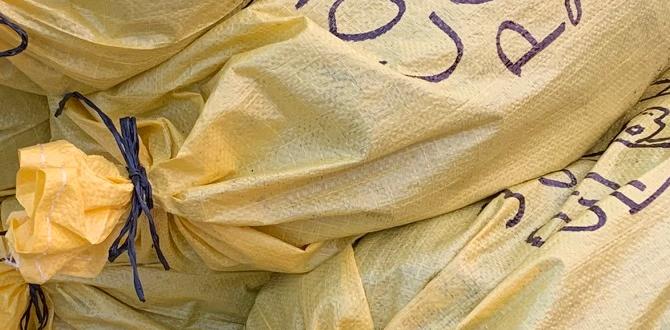
Is Composted Manure Safe for Vegetable Gardens?
Using composted manure can boost your vegetable garden’s health. It adds nutrients and improves soil structure. However, is it really safe? Well, properly composted manure can eliminate harmful pathogens. This means fewer risks for you and your family. When choosing manure, always opt for well-aged compost. Did you know that fresh manure can burn plants? It’s better to play it safe and wait a bit before using it. Happy gardening!Understanding Composted Manure
Definition and types of composted manure. Nutritional benefits for soil enrichment.
So, what’s the scoop on composted manure? It’s like giving your soil a nutritious hug! Composted manure comes from various sources, like cows, chickens, and even worms. Each type adds special goodies to your garden. This magical mix is packed with nutrients, helping plants grow strong and healthy. Nitrogen, phosphorus, and potassium are the stars here, boosting soil health and making sure your veggies thrive. Just remember, too much of a good thing can turn your garden into a jungle!
| Type of Manure | Nutritional Benefits |
|---|---|
| Cow Manure | Rich in nitrogen, good for leafy growth. |
| Chicken Manure | Packed with phosphorus, great for fruiting plants. |
| Worm Castings | Boosts soil structure and aeration. |
Composting manure not only feeds your plants but can also help the environment by recycling waste. Who knew gardening could be such a feel-good adventure?
Benefits of Using Composted Manure in Vegetable Gardens
Enhances soil structure and moisture retention. Provides essential nutrients for plant growth.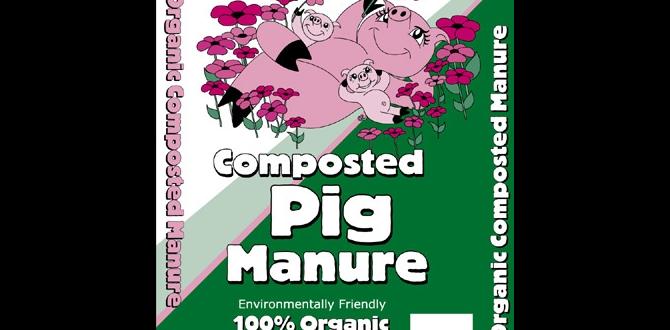
Using composted manure in your vegetable garden has some awesome benefits. First, it makes the soil better at holding water. Plants love when their roots can slurp up moisture. Next, it adds essential nutrients like nitrogen and potassium, which are like vitamins for your veggies. They grow big and strong! Plus, composted manure is eco-friendly, turning waste into garden gold. So, why not let your garden feast on this nutritious treat?
| Benefit | Description |
|---|---|
| Enhances Soil Structure | Improves air flow and water retention, helping plants thrive. |
| Nutrient Boost | Provides essential nutrients for vigorous plant growth. |
Potential Risks of Using Composted Manure
Pathogen concerns and disease transmission. Chemical residues and their impact on health.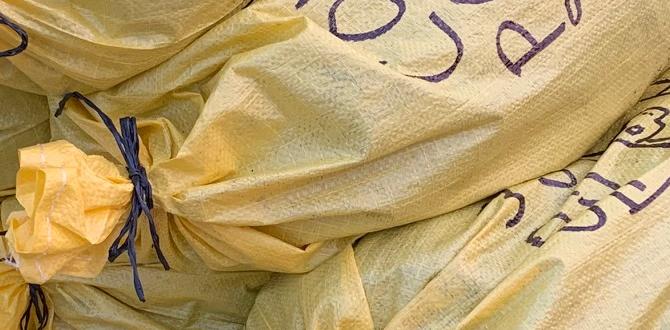
Using composted manure can be helpful, but it also comes with risks. One concern is pathogens. These tiny germs can cause illness. If manure isn’t properly composted, these germs can linger in the soil. Another worry is chemical residues. Some products used in animal feed can leave behind harmful chemicals. These can affect human health. Always be cautious with composted manure. Make sure it’s well-made and safe before using it in your garden.
Are there health risks from using composted manure?
The short answer is yes. Improperly composted manure can carry germs and chemicals that are harmful. This is why it’s vital to compost manure correctly.
Key Points:
- Pathogen risks from germs.
- Chemical residues can affect health.
- Proper composting helps reduce risks.
How to Safely Use Composted Manure in Your Garden
Recommended composting and application techniques. Timing and quantity guidelines for application.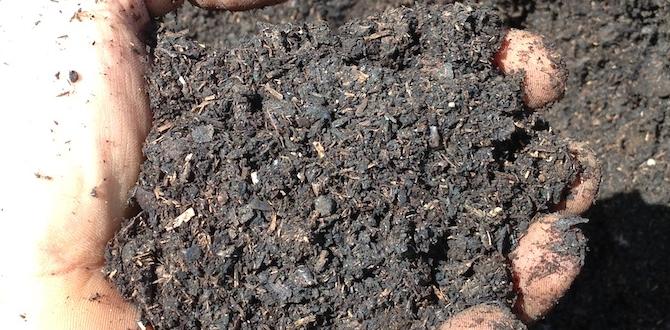
Using composted manure in your garden can be a fun adventure! First, make sure to compost it fully. This means letting it sit for a few months. It should look dark and crumbly, like chocolate cake. You can apply it in early spring or fall, around 1 to 2 inches on the soil’s surface. Too much can be like overfeeding a goldfish—just messy!
| Timing | Quantity |
|---|---|
| Early Spring | 1-2 inches |
| Fall | 1-2 inches |
So, spread the love (and compost) around wisely, and your veggies will thrive with a sprinkle of humor and care!
Comparing Composted Manure to Other Fertilizers
Nutrient content comparison with synthetic fertilizers. Costeffectiveness and sustainability considerations.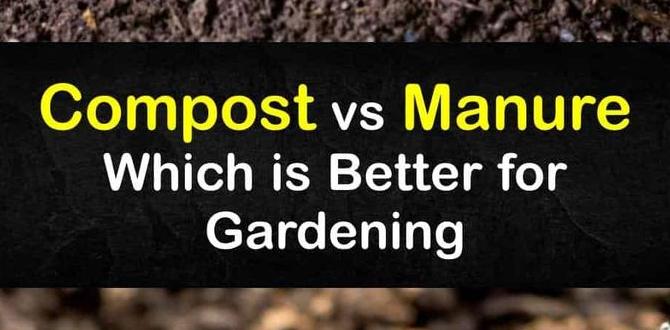
Many gardeners face the choice between composted manure and synthetic fertilizers. When it comes to nutrients, composted manure generally offers a balanced mix of nitrogen, phosphorus, and potassium. In comparison, synthetic fertilizers usually have higher concentrations of specific nutrients but might lack the rich organic matter found in manure. Additionally, composted manure is often more cost-effective in the long run. It helps build soil health, making your garden more sustainable. After all, who doesn’t want a garden that not only grows veggies but also makes Mother Nature smile?
| Type of Fertilizer | Nutrient Content | Cost-effectiveness |
|---|---|---|
| Composted Manure | Balanced | High |
| Synthetic Fertilizers | Concentrated | Variable |
Common Misconceptions About Composted Manure
Addressing fears related to odors and pests. Clarifying guidelines on usage for different vegetables.
Many people worry that composted manure will smell bad or attract pests. The truth is, well-prepared composted manure has little to no odor when used correctly. You won’t have the scent of a stinky sock lurking in your garden! Also, knowing which vegetables can handle composted manure is key. Leafy greens love it, while root veggies may prefer a lighter touch. Check out the friendly chart below:
| Vegetable Type | Manure Usage |
|---|---|
| Leafy Greens | Great – They enjoy the nutrients! |
| Root Vegetables | Light – Don’t overdo it! |
| Fruiting Vegetables | Moderate – They need some love! |
By understanding these points, you can enjoy a thriving veggie garden without the worries!
Case Studies and Testimonials
Success stories from experienced gardeners. Research findings supporting the use of composted manure.
Many gardeners share amazing success stories about using composted manure. Their plants grow bigger and healthier. Research backs this up. Studies show that composted manure can boost soil quality and crop yield. Here’s what some experienced gardeners say:
- “My tomatoes grew twice as large!”
- “The flowers bloomed like never before!”
- “I use less water because my soil holds it better.”
These stories inspire others to try composted manure. It’s a safe choice that helps gardens thrive.
Is composted manure safe for vegetable gardens?
Yes, composted manure is safe for vegetable gardens. It enriches the soil and supports plant growth without harmful effects. Always use well-composted manure to ensure safety.
Conclusion
In conclusion, composted manure can be safe for vegetable gardens if handled correctly. Always compost it first to kill harmful germs. Use it in moderation, and mix it well into the soil. This adds nutrients and helps plants grow. If you want to learn more, read about safe gardening practices. Happy gardening!FAQs
What Are The Potential Pathogens Found In Raw Manure That May Affect Vegetable Gardens?Raw manure can have dangerous germs called pathogens. These germs include E. coli, Salmonella, and Listeria. They can make you sick if they get into your food. That’s why we need to be careful when using manure in gardens. Always wash your vegetables well before eating them!
How Long Should Manure Be Composted To Ensure It Is Safe For Use In Vegetable Gardens?To make manure safe for your vegetable garden, you should compost it for at least three months. During this time, good bacteria break down the waste. It’s important to keep the compost pile warm, so mixing it often helps too. After three months, it’s safer to use and helps your plants grow. Always remember, composted manure is better than fresh manure!
What Are The Signs Of Properly Composted Manure That Indicate It Is Safe For Crops?You can tell if manure is safe for crops by looking for a few signs. First, it should be dark brown or black. It should also feel crumbly and not smell bad. If you see worms, that’s a good sign, too! Finally, make sure it’s cool to the touch, not hot.
Are There Specific Types Of Manure That Are Considered Safer For Use In Vegetable Gardens?Yes, some manures are safer for vegetable gardens. Well-aged manure, like cow or horse manure, is a good choice. It’s lower in harmful germs and smells less. Always make sure the manure is from healthy animals. This way, you can grow safe and yummy vegetables!
How Can Composted Manure Improve Soil Health And Vegetable Crop Yields?Composted manure is great for soil health. It adds important nutrients that plants need to grow. These nutrients help your vegetables become bigger and tastier. Compost also makes the soil soft and full of tiny bugs that help plants. Using composted manure means you can grow more food!

